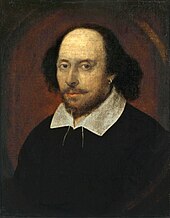Culture
The culture of the United Kingdom has been influenced by many factors including: the nation's island status; its history as a western liberal democracy and a major power; as well as being a political union of four countries with each preserving elements of distinctive traditions, customs and symbolism. As a result of the British Empire, British influence can be observed in the language, culture and legal systems of many of its former colonies including Australia, Canada, India, Ireland, New Zealand, Pakistan, South Africa and the United States; a common culture conned today as the Anglosphere. The substantial cultural influence of the United Kingdom has led it to be described as a "cultural superpower".[122][123] A global opinion poll for the BBC saw the United Kingdom ranked the third most positively viewed nation in the world (behind Germany and Canada) in 2013 and 2014.[482][483]
Literature
"British literature" refers to literature associated with the United Kingdom, the Isle of Man and the Channel Islands. Most British literature is in the English language. In 2005, some 206,000 books were published in the United Kingdom and in 2006 it was the largest publisher of books in the world.[484]
The English playwright and poet William Shakespeare is widely regarded as the greatest dramatist of all time,[485][486][487] and his contemporaries Christopher Marlowe and Ben Jonson have also been held in continuous high esteem. More recently the playwrights Alan Ayckbourn, Harold Pinter, Michael Frayn, Tom Stoppard and David Edgar have combined elements of surrealism, realism and radicalism.[citation needed]
Notable pre-modern and early-modern English writers include Geoffrey Chaucer (14th century), Thomas Malory (15th century), Sir Thomas More (16th century), John Bunyan (17th century) and John Milton (17th century).[citation needed] In the 18th century Daniel Defoe (author of Robinson Crusoe) and Samuel Richardson were pioneers of the modern novel.[citation needed] In the 19th century there followed further innovation by Jane Austen, the gothic novelist Mary Shelley, the children's writer Lewis Carroll, the Brontë sisters, the social campaigner Charles Dickens, the naturalist Thomas Hardy, the realist George Eliot, the visionary poet William Blake and Romantic poet William Wordsworth.[citation needed] 20th-century English writers include the science-fiction novelist H. G. Wells; the writers of children's classics Rudyard Kipling, A. A. Milne (the creator of Winnie-the-Pooh), Roald Dahl and Enid Blyton; the controversial D. H. Lawrence; the modernist Virginia Woolf; the satirist Evelyn Waugh; the prophetic novelist George Orwell; the popular novelists W. Somerset Maugham and Graham Greene;[citation needed] the crime writer Agatha Christie (the best-selling novelist of all time);[488] Ian Fleming (the creator of James Bond); the poets W.H. Auden, Philip Larkin and Ted Hughes; the fantasy writers J. R. R. Tolkien, C. S. Lewis and J. K. Rowling; the graphic novelists Alan Moore and Neil Gaiman.[citation needed]
Scotland's contributions include the detective writer Arthur Conan Doyle (the creator of Sherlock Holmes), romantic literature by Sir Walter Scott, the children's writer J. M. Barrie, the epic adventures of Robert Louis Stevenson and the celebrated poet Robert Burns. More recently the modernist and nationalist Hugh MacDiarmid and Neil M. Gunn contributed to the Scottish Renaissance. A more grim outlook is found in Ian Rankin's stories and the psychological horror-comedy of Iain Banks. Scotland's capital, Edinburgh, was UNESCO's first worldwide City of Literature.[489]
Britain's oldest known poem, Y Gododdin, was composed in Yr Hen Ogledd (The Old North), most likely in the late 6th century. It was written in Cumbric or Old Welsh and contains the earliest known reference to King Arthur.[490] From around the seventh century, the connection between Wales and the Old North was lost, and the focus of Welsh-language culture shifted to Wales, where Arthurian legend was further developed by Geoffrey of Monmouth.[491] Wales's most celebrated medieval poet, Dafydd ap Gwilym (fl.1320–1370), composed poetry on themes including nature, religion and especially love. He is widely regarded as one of the greatest European poets of his age.[492] Until the late 19th century the majority of Welsh literature was in Welsh and much of the prose was religious in character. Daniel Owen is credited as the first Welsh-language novelist, publishing Rhys Lewis in 1885. The best-known of the Anglo-Welsh poets are both Thomases. Dylan Thomas became famous on both sides of the Atlantic in the mid-20th century. He is remembered for his poetry – his "Do not go gentle into that good night; Rage, rage against the dying of the light" is one of the most quoted couplets of English language verse – and for his "play for voices", Under Milk Wood. The influential Church in Wales "poet-priest" and Welsh nationalist R. S. Thomas was nominated for the Nobel Prize in Literature in 1996. Leading Welsh novelists of the twentieth century include Richard Llewellyn and Kate Roberts.[493][494]
There have been a number of authors whose origins were from outside the United Kingdom but who moved to the UK and became British. These include Joseph Conrad,[495] T. S. Eliot,[496] Kazuo Ishiguro[497] and Sir Salman Rushdie.[498] Others have chosen to live and work in the UK without taking up British citizenship, such as Ezra Pound.[499][500] Historically, a number of Irish writers, living at a time when all of Ireland was part of the United Kingdom, also spent much of their working lives in England. These include Oscar Wilde,[501][502] Bram Stoker[503] and George Bernard Shaw.[504][505]


No comments:
Post a Comment